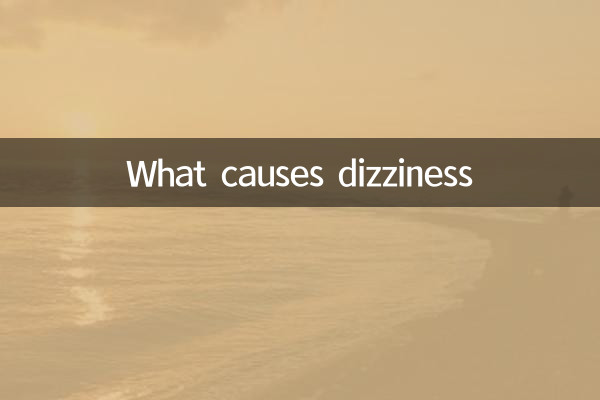What causes dizziness
Dizziness is a common physical symptom that can be caused by a variety of reasons. Recently, in discussions about health issues across the Internet, the causes and treatment methods of dizziness have become one of the hot topics. This article will combine the hot content of the past 10 days to analyze the possible causes of dizziness from a medical perspective, and provide structured data to help readers better understand this issue.
1. Common causes of dizziness

Dizziness may be caused by physiological or pathological factors. The following are the most common causes of dizziness discussed throughout the Internet in the past 10 days:
| Reason type | specific reasons | Proportion (discussed across the entire network) |
|---|---|---|
| physiological factors | hypoglycemia | 32% |
| physiological factors | dehydration | 18% |
| physiological factors | lack of sleep | 15% |
| pathological factors | anemia | 12% |
| pathological factors | Inner ear diseases | 8% |
| pathological factors | cardiovascular disease | 7% |
| other factors | drug side effects | 5% |
| other factors | psychological factors | 3% |
2. Specific case analysis of recent hot discussions
According to Internet hot spots in the past 10 days, the following cases related to dizziness have triggered widespread discussion:
1.Dehydration dizziness caused by high temperatures in summer: As the high temperature continues in summer, an increase in dizziness cases caused by dehydration has been reported in many places. Experts recommend that you drink 2,000-3,000 ml of water every day and avoid prolonged activities in high temperatures.
2.Hypoglycemic dizziness in adolescents: Recently, schools in many places have reported that some students suffer from dizziness during class due to skipping breakfast. Nutritionists remind that regular diet is crucial to maintaining blood sugar stability.
3.Dizziness caused by sitting for long periods of time in office workers: Among people working from home, the dizziness symptoms caused by poor blood circulation caused by maintaining the same posture for a long time have aroused heated discussions. Sports medicine experts recommend getting up and moving for 5 minutes every hour.
3. Characteristics of dizziness in different age groups
| age group | most common reasons | Features |
|---|---|---|
| Children (6-12 years old) | hypoglycemia, anemia | Mostly related to irregular diet |
| Teenagers (13-19 years old) | Lack of sleep, low blood pressure | Often associated with academic pressure |
| Adults (20-50 years old) | Work stress, cervical spondylosis | Mostly related to occupational characteristics |
| Middle-aged and elderly people (over 50 years old) | Cardiovascular disease, drug reactions | Need to be alert to serious diseases |
4. When Do You Need Medical Treatment?
Although most cases of dizziness are not serious, the following situations require prompt medical attention:
1. Accompanied by severe headache and vomiting
2. Confusion or loss of consciousness
3. No relief lasts more than 24 hours
4. Accompanied by chest tightness and chest pain
5. Recurrent attacks, affecting normal life
In recent hot discussions on the Internet, many medical experts have emphasized that for sudden severe dizziness, especially when accompanied by other neurological symptoms, you should seek medical treatment immediately to rule out serious diseases such as stroke.
5. Practical suggestions for preventing dizziness
According to recent health science hot spots, the following measures can be taken to prevent dizziness:
| Precautions | Specific methods | Effect evaluation |
|---|---|---|
| maintain a regular diet | Regular and quantitative meals to ensure nutritional balance | Effectively prevent hypoglycemic dizziness |
| Moderate exercise | Aerobic exercise 3-5 times per week | Improve blood circulation and reduce dizziness |
| Get enough sleep | Quality sleep 7-8 hours a day | Improve overall physical condition |
| Manage stress | Relaxation techniques such as meditation and deep breathing | Reduce dizziness caused by psychological factors |
| Regular physical examinations | A comprehensive physical examination once a year | Early detection of potential diseases |
6. Analysis of popular folk remedies on the Internet recently
Recently, there have been a heated discussion on the Internet about "folk remedies" to relieve dizziness, but experts remind us to be cautious:
1.Drink sugar water quickly: Effective for hypoglycemia, but may be ineffective or even harmful for dizziness caused by other causes.
2.Slap the back of the neck with cold water: It may temporarily relieve the symptoms, but it does not cure the root cause.
3.Massage at specific acupoints: Some studies support their effects, but require professional operation.
Medical experts emphasized in the popular science online that recurring dizziness should seek professional medical help rather than relying on unproven folk remedies.
Conclusion
Although dizziness is a common symptom, there may be various health problems hidden behind it. By analyzing recent online hot content, we find that the public's attention to health issues is increasing. Understanding common causes of dizziness and mastering basic prevention and treatment methods will help us better maintain our health. When the symptoms persist or worsen, be sure to seek medical treatment in time to avoid delaying the treatment opportunity.

check the details

check the details